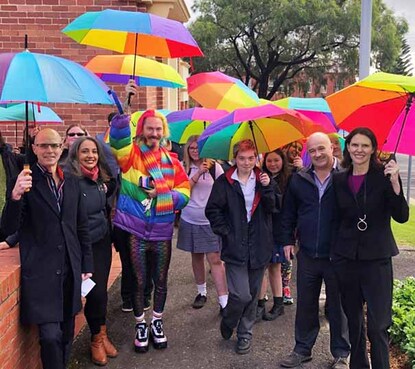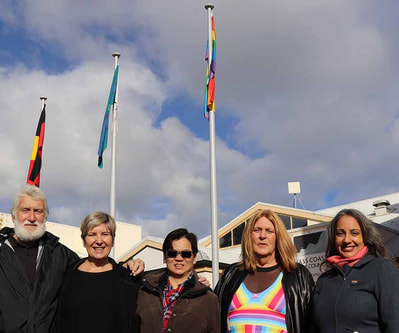 From left, Greg Tingate, Cr Leticia Laing, Mykey O’Halloran, Lauren Brooks, Bass Coast Mayor Brett Tessari and
From left, Greg Tingate, Cr Leticia Laing, Mykey O’Halloran, Lauren Brooks, Bass Coast Mayor Brett Tessari and CEO Ali Wastie
I NEVER thought I’d see the day when International Day against Homophobia would be marked in Wonthaggi, let alone by our home-grown, footy-loving mayor raising the rainbow flag, surrounded by a sea of people toting rainbow umbrellas.
It reminded me of how far we’ve come since I first stumbled on this town. In the winter of 1996, my partner and I bought the poor person’s version of a holiday house: a two-bedroom miner’s cottage in Wonthaggi, complete with outside loo and a bathroom in a cupboard.
It was clearly a local point of interest, like the penguins. I pictured uteloads of juiced up home boys taking their visitors for a tour of the homosexuals – and stopping outside our place! Like one of those horror movies set in the American midwest.
That night I rang my partner, who was in Melbourne, and told her the story. “Perhaps we should have gone to Daylesford,” I said.
“We couldn’t afford Daylesford,” Gab said. “Besides, you wouldn’t like it.”
She was right but I thought we should stay under the radar. I told Gab to try and act normal when she came down but we’d lived in Collingwood for so long we no longer knew what was normal and what wasn't.
As it turned out, we didn’t have to worry. We’d bought on the wrong side of the tracks – the south side of Wonthaggi – and were surrounded by hippies, birdwatchers, philosophers, chook-lovers, stoners, drummers, maypole dancers, political dissidents and botanists. In all honesty, we were probably the straightest people in the street.
So we rubbed along pretty well with the neighbours, though every now and then we’d get a whiff of an alternative universe. In the late 1990s, Bass Coast was a pretty depressed place economically, and the council’s economic development officer suggested the local tourism industry should be chasing “the pink dollar”. A prominent local businessman responded that he had an explosives licence and volunteered to take “these people” up to the mine and deal with them.
It was a really funny joke! Only one person, Yvonne McCrae (a current Post reader), wrote to the editor of the Sentinel Times to protest. She suggested that businesses that did not want the ‘pink dollar’ should identify themselves. “Perhaps the Business Association should canvass their members, compile a list where ‘these people’ are not welcome to spend money, and open-minded people can spread this list widely so no one is compromised or embarrassed.”
My friend and neighbour Frank, who told me this story, reels off the names of young people he knew who got out of the place as soon as they could. “S/he went to the city and never came back” was usually shorthand for “S/he is gay”.
Though even in the city, they were not always safe. Frank recalls a young work colleague, a prominent local footballer, relating casually of his weekend: “We went to the city and did some poofter bashing.”
Maybe it started when a couple of gay men from the city bought the Wonthaggi Tattslotto shop. Keith and Wayne weren’t about to go back into the closet and people just got used to them. Giving up your weekly Tatts ticket on a matter of principle was a step too far for most. Besides, people liked them.
Then in 2017, with the same-sex marriage debate raging, Cr Geoff Ellis persuaded his fellow councillors to come out and support marriage equality. “It's important for kids, especially in rural areas like Bass Coast,” he said. “They need to know that ordinary people, with some prominence in the community, believe LGBTI lives have equal worth.”
Six of his eight fellow councillors said “We do” and Bass Coast became one of the first rural councils in Australia to support marriage equality, attracting considerable media interest with reports on ABC Gippsland and Channel 9.
It wasn’t popular with everyone, of course. A Post reader wrote: “The views of the silent majority will always prevail at the right time and place no matter the attempt of the loud few who wish to push for dangerous social engineering ...”
But, as we now know, the silent majority had turned.
In 2019, council CEO Ali Wastie told staff she wanted the council to celebrate and welcome LGBTQI members of the community, and for LGBTQI staff “to bring their full selves to work”. She paid tribute to Cr Ellis, who had taken it upon himself to push for conscious inclusiveness.
 Raising the flag for International Day Against Homophobia: from left, Geoff Ellis, Linda Wilson, Sally Conning and Cr Leticia Laing
Raising the flag for International Day Against Homophobia: from left, Geoff Ellis, Linda Wilson, Sally Conning and Cr Leticia Laing And to all those young people who head to the city to find themselves, whatever form that might take, here’s hoping you know you can now come back home whenever you’re ready and there is a place for you here too.